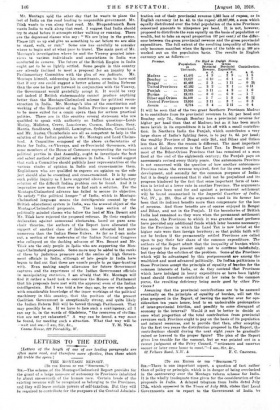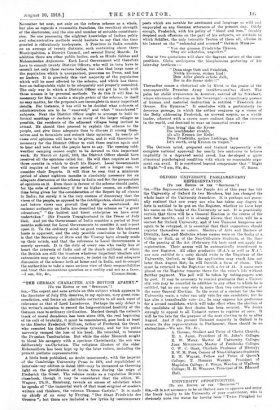[To THE EDITOR OP THE " $PECT4TOR.'l Sian—There is one
important aspect, a question of fact rather than of policy or principle, which is in danger of being overlooked in the controversy over the Montagu `reform scheme for India. It is the wholly inadequate time given for the consideration of the proposals in India. A delayed telegram from India dated July 17th, which appeared in the Times of July 30th, states that Local Governments are to report to the Government of India by
November let next, not only on the reform scheme as a whole, but also as regards a reasonable franchise, the resultant strength of the electorates, and the size and number of euitable constituen- cies. No one possessing the slightest knowledge of Indian polity and administrative methods would hesitate to say that the time granted is ridiculously inadequate. A Province in India consists on an average of twenty districts, each containing about three Municipalities, a District Council, and several Rural Boards. In addition there are other public bodies, such as Hindu Sabha, and 2dehammedan Anjumans. Each Local Government will therefore have to consult twenty District Officers, who will in turn have to ooneult not only these various bodies, but also that large mass of the population which is unorganized, possesses no Press, and has no leaders. It is precisely this vast majority of the population which will be most affected by the scheme, and which has there- fore an indisputable right to be adequately and properly consulted. The only way in which a District Officer can get in touch with these masses is by personal methods. To do this it will first be necessary for him to make a simple precis of the scheme, in itself no easy matter, for the proposals are incomplete in many important details. For instance, it has still to be decided what subjects of administration are to be "reserved," and what "transferred" eubjeets. Next the District Officer ought to arrange to hold in- formal meetings or durbars in as many of the larger villages as possible, the residents of the adjacent villages being invited to attend. He should then proceed to explain the scheme to the people, and give them adequate time to discuss it among them- selves and to formulate and submit their opinions. In nearly all cases oral opinions will have to be given., and it will therefore be necessary for the District Officer to visit these centres again and be hear and note what the people have to say. The ensuing cold- weather camping season ought to be devoted to this important work. By March or April, 1919, the District Officer should have received all the opinions called for. He will then require at least three months in which to draft his Report. Local Governments will require at least the same period, if not a longer one, to consider their Reports. It will thus be seen that a minimum period of about eighteen months is absolutely necessary for an adequate discussion of the scheme in India and for the preparation of opinions on it. Even those in favour of the scheme should insist, for the sake of consistency if for no higher reason, on sufficient time being given for the consideration of the Report by all classes In India; for surely it is the very essence of democracy that the view of the people, as opposed to the intelligentsia, ehould prevail; and before views can prevail they must be ascertained. An eminent authority on India has described the scheme as "a great adventure," "the boldest and finest enterprise we have ever undertaken" (Sir Francis Younghusband in the Times of July net). And yet the Government of India consider a period of four mouths sufficient for Local Governments to consider it and report upon it. To the ordinary mind no good reason for this indecent haste is apparent, and the only possible conclusion to be drawn is that the Secretary of State and the Viceroy have already made up their minds, and that the reference to Local Governments is merely eyewash. It is the duty of every one who really has at heart the interests of India and of its dumb millions, of whom the British are still the trustees whatever impatient idealists and extremists may say to the contrary, to insist on full and adequate discussion of the scheme both at home and in India, and to compel the authorities to take a more serious view of their responsibilities and treat this momentous question as a reality and not as a farce.



































 Previous page
Previous page